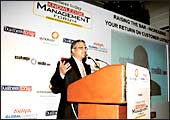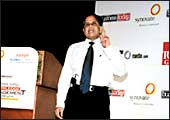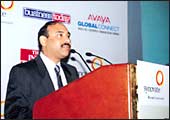 |
| Symmetrix's Crosby: Measure, model
and manage |
You
could be a Harley Davidson fan (therefore, a tattoo is in order).
Then, you may not. Either way, there's no denying the fact that
if loyalty to a brand were to be defined succinctly, the word
"Harley" would suffice. However, even Harley had its
bad days. The cult bike company almost went out of business in
the 1980s, and in a move to save its neck, and the business, Harley
created H.O.G. (Harley Owners Group), a platform for Harley riders
to interact and share their passion for the brand. This initiative
reignited the flagging interest in the company and its bikes,
and revived its business. Today, the wait for a Harley is a year
long. And with over 900,000 members in its fold, H.O.G. is probably
one of the most recognised examples of what a sound customer loyalty
programme can do to the fortunes, and brand loyalty, of a company.
As Lawrence A. Crosby drove home the point
on Harley to the audience, heads bobbed. Crosby, after all, should
know a thing or two about customer loyalty. The founder and ceo
of Symmetrics, the global practice in the area of customer loyalty
of Synovate (the market research arm of communications behemoth,
Aegis Group Plc.), he is a recognised expert in the field, having
worked with companies around the globe on customer loyalty programmes
for over 30 years. In India for the Business Today Knowledge Management
Forum in New Delhi on July 12 and Mumbai on July 14, organised
by BT in association with Synovate and Avaya Global Connect, Crosby
addressed a select gathering of senior and middle-level managers
of India Inc. at Delhi's Marriott Hotel on the theme "Raising
the bar: Increasing your return on customer loyalty". On
the occasion, Pavan Varshnei, Publishing Director, Business Today,
said: "The goal of the BT Knowledge Management Forum is to
define issues, provide commentary by experts, and set the agenda
for evolving best practices."
 |
| Synovate India's Managing Director Alok
Shankar |
 |
| Avaya Global connect's Director (Marketing)
Amit Sinha |
 |
| Business Today's Publishing Director
Pavan Varshnei |
"To raise the bar and move an organisation
forward requires embedding customer loyalty into the fabric of
the organisation," declared Crosby. Harley wasn't the only
example he used to prove the truism behind this statement. Cirque
Du Soleil, Apple, Nike, Starbucks and South West Airlines were
other notable instances he touched upon to demonstrate the fact
that companies in the US, and elsewhere, were increasingly achieving
their marketing and financial objectives through customer loyalty
programmes. Defining customer loyalty as "a behavioural predisposition
on the part of the customer to respond favourably towards the
brand/company consistently and across situations", Crosby
pointed out that it was increasingly becoming the centrepiece
of business strategy. Having interviewed over 500 CEOs worldwide
on their top business priorities, Crosby had arrived at a rather
interesting conclusion. Among the priorities laid out, sustained
topline, somewhat predictably, came out tops with 51 per cent
of the CEOs considering it the most important, followed by adaptability
(45 per cent), and customer loyalty in third position (41 per
cent).
So, is customer loyalty an abstract concept,
which cannot be laid down in black and white? Is it something
you can only hope to achieve through better marketing and higher
service standards? Not so, if you went by Crosby's analysis. To
gain customer loyalty, Crosby advised companies to follow a three-step
process: measure, model and manage. "Measure" entailed
creating a performance matrix of touch points that a particular
organisation can be measured by; "model" meant creating
statistical approaches to measure customer loyalty; and "manage"
is a process of creating an atmosphere within the organisation
that would align it and its employees to customer loyalty. There's
a caveat, though, as Crosby warns: "No single study works;
there has to be an integrated measurement system that looks at
all touch points that influence customer loyalty."
The seminar wasn't a one-man sermon, though.
The senior and middle-level managers in attendance also put up
their queries for the expert to answer. Rishabh Mehrotra, General
Manager (Marketing), ACL Wireless, wanted to know how he could
ensure customer loyalty in a business-to-business environment,
which inevitably entailed lack of control over franchisees. Crosby
suggested leveraging an individual franchisee by exercising strict
control over quality. However indirect, all customer interactions
were touch points that gave his company opportunities to improve.
Then, Raji Chandru, Deputy General Manager (Patient Services),
Indraprastha Apollo Hospitals, wanted to know how different services
in a hospital could be measured by a standardised yardstick. To
which Crosby's answer was: all services could have different measurements,
but the standardised yardstick must be attentive patient care.
Some of the attendees also touched upon their own experiences
in enhancing customer loyalty. Amit Sinha, Director (Marketing)
at Avaya Global Connect, spoke of how Avaya concentrated on relationship
management after parting ways with Tata Telecom. "We realised
our forte was customer relations and we were further aided on
the technology front by Avaya," said Sinha.
A parting thought here. For those who believe
that purchase decisions in India, particularly rural India, are
based primarily on cost considerations, Crosby has an observation
to make. "After seeing washing machines displayed in sitting
rooms in rural India and talked about with great pride, we reached
a conclusion that a purchase decision has more emotional motivation
here in India than in the West," he said. According to Crosby,
in emerging markets, all other factors being nearly equal, emotional
motivation is the single biggest deciding factor behind a purchase.
|







